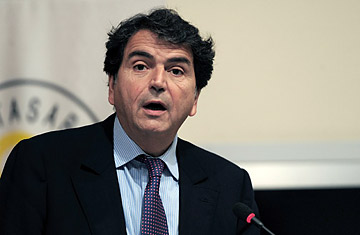
French Minister of State for European Affairs Pierre Lellouche speaks during a conference at Galatasaray University in Istanbul on Oct. 16, 2009
Swipes across the English Channel are as old — and often as nasty — as the centuries-old Franco-British rivalry itself. But few barbs have caused as much annoyed bewilderment as the recent remarks by the French Minister of State for European Affairs, Pierre Lellouche, who called officials from the British Conservative Party "pathetic" and "autistic" and said they were guilty of having "castrated" Britain's influence in Europe. Good thing Lellouche is known as a staunch Anglophile, or he might have really gotten ornery.
Lellouche's verbal spanking of Tory Euroskeptics was delivered in an interview with the Guardian on Nov. 4. It immediately sparked a controversy in both nations that has only begun to settle. Lellouche was quoted criticizing promises by Conservative leaders not only to oppose continuing E.U. integration if their party wins next year's general elections in Britain, but also to wrest back political and economic powers previously ceded to Brussels. The pledges by Conservative leader David Cameron came at the very moment E.U. integration took a huge step forward with the final ratification of the Lisbon Treaty earlier this month.
"It's just very sad to see Britain, so important in Europe, just cutting itself out from the rest and disappearing from the radar," Lellouche told the Guardian, describing the effort as "pathetic" and likening the Tories' Europe hostility to autism. "They have one line, and they just repeat one line. It is a very bizarre sense of autism."
This was hardly the end of it. Lellouche also faulted Cameron's decision earlier this year to withdraw the Tories from the ruling center-right European Peoples' Party group in the European Parliament in favor of right-wing partners who are accused of being anti-Semitic and homophobic. He also warned that if a new Conservative government in Britain fulfilled its anti-European campaign promises next year, it would weaken and isolate Britain, not reinforce it. "They have essentially castrated your U.K. influence in the European Parliament," Lellouche said in the interview. "Go away for two to three years, in your political economic situation you're going to be all by yourself and you'll come back. Go ahead and do it. You want to be marginalized? Well, you go for it."
Such raw commentary from France's top Europe diplomat understandably raised hackles in Britain — as well as eyebrows in France. The uproar led Lellouche's spokesman to suggest that his comments had been poorly translated (a feeble dodge once the Guardian noted that the interview had been conducted in English). Still later, Lellouche, who is perfectly fluent in English, explained that he had used terms like "autism" and "pathetic" in a flippant, colloquial French manner. By the end of last week, however, Lellouche took a significant step back, calling himself "the most Anglophile politician" in France and saying that he respects British sensibilities on Europe.
Lellouche's status as an unabashed Anglophile and ardent ally of both Britain and the U.S. is well-known in France, which makes his outburst all the more surprising. He was one of the few French politicians to back the U.S.- and Britain-led war in Iraq, and he has long championed both countries' relatively pro-Israel positions in the Middle East. A foreign policy wonk and NATO enthusiast, Lellouche has become a familiar figure in London, Washington and New York over the years, huddling with British and American politicians to influence decision-making on both sides of the Atlantic. However, his reputation for being somewhat of a loose cannon prevented him from being tapped for a government post until the straight-talking Sarkozy gave him the Europe Minister job.
"Pierre Lellouche is known for speaking his mind freely and pushing limits — which is often effective in politics but troublesome for someone playing a diplomatic role," says Jean-Marc Lech, co-president of the polling firm Ipsos, adding that Lellouche's swagger and trash-talking are traits he shares with Sarkozy. "Sarkozy gave Lellouche a position in government no one would risk before. But once Lellouche stepped over the line on his own, Sarkozy made him clean up the mess himself."
Despite the fact the Élysée was not pleased with Lellouche's anti–Conservative Party remarks, Sarkozy did not give his Europe Minister a public tongue-lashing. One reason may be that Lellouche's comments — although bombastic — hardly misinterpreted the ferocious hostility that the Tories have toward Europe, which most of the E.U. views with revulsion and disdain. Still, as French centrist European parliamentarian Mireille de Sarnez points out, insulting the Conservative position is counterproductive.
"You're not going to encourage change in traditional British wariness of Europe with the equally traditional French habit of speaking down to people as you give them lessons," de Sarnez says. "We must avoid creating long-term antagonism by airing short-term frustration, because history shows leaders of all kinds tend to be more pragmatic once elected to office, which we hope will be David Cameron's case if elected."
Karel Lannoo, head of the Center for European Policy Studies in Brussels, hopes that's true, but says a Tory win and an anti-E.U. drive in Britain is "the biggest source of concern and discussion within Europe today." Indeed, Lannoo says that the ambient buzz "may be what [Lellouche] found himself echoing, however undiplomatically." Given the likelihood of a Tory win, however, it may not be the last time Lellouche feels moved to address the issue — and next time, he may not be alone in doing so.
